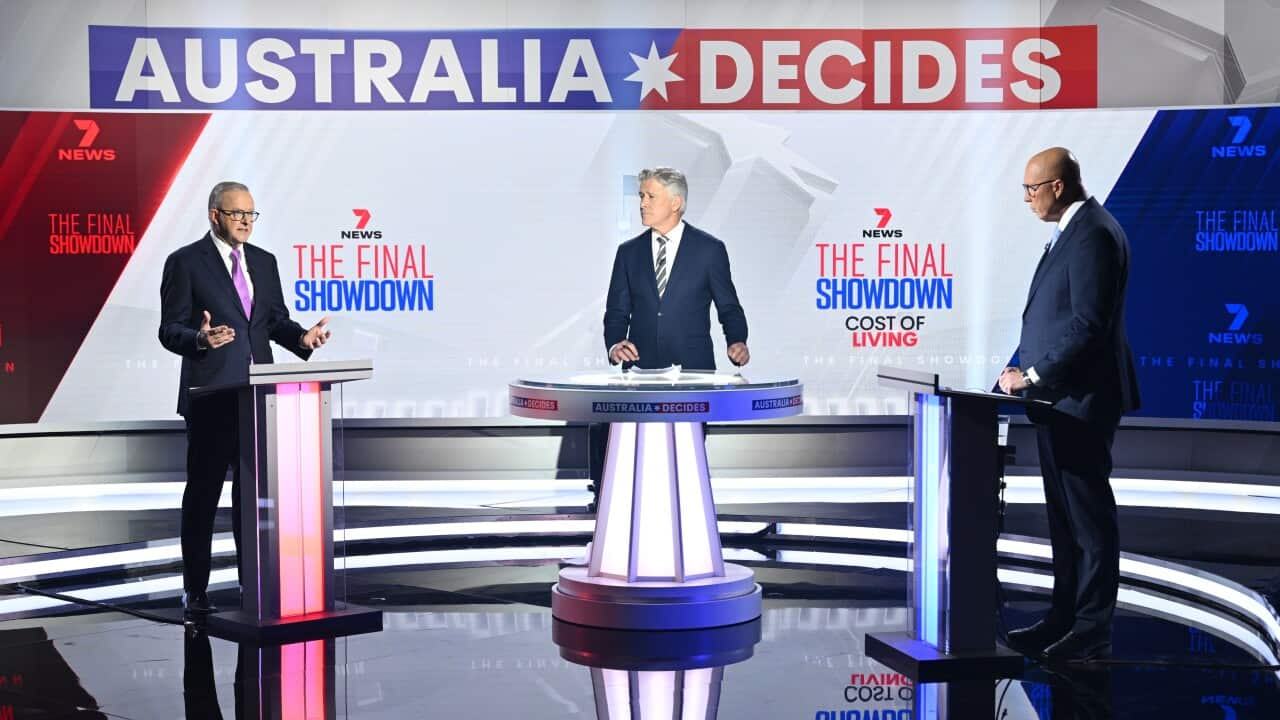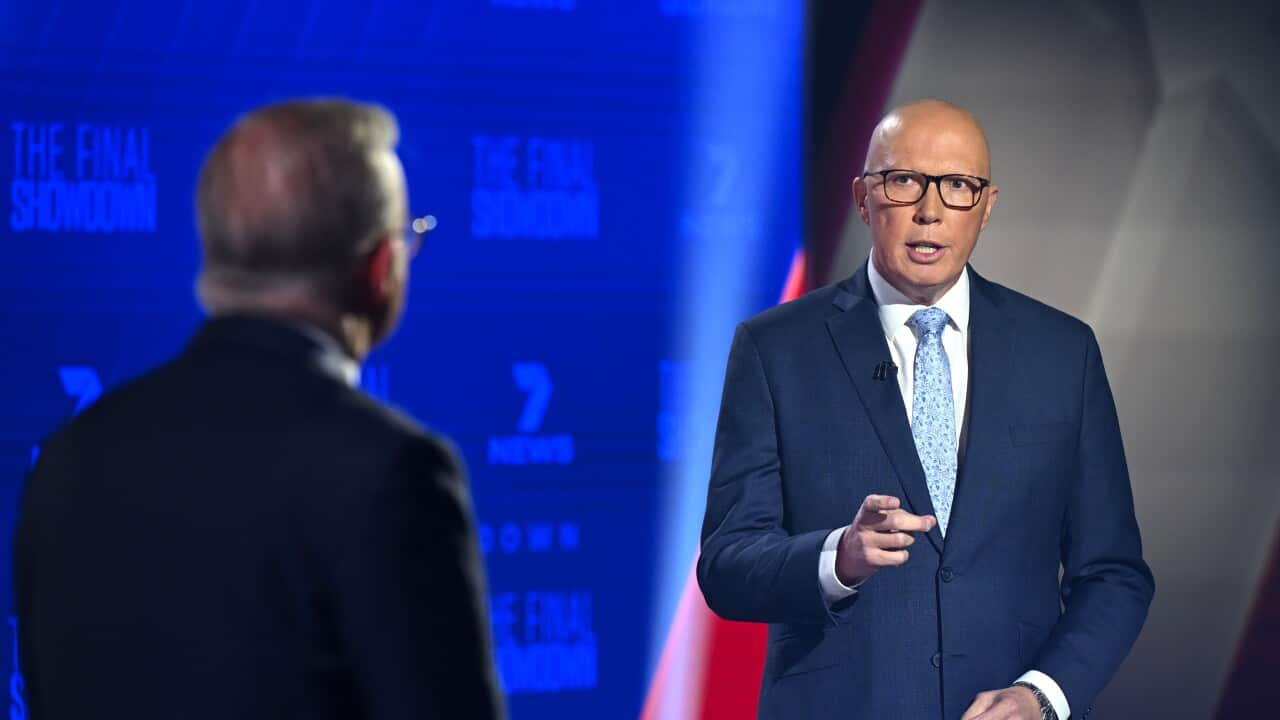and momentarily stumbled when answering cost-of-living questions during the final debate of the federal election campaign.
The two leaders have gone head-to-head four times in the last three weeks.
Polling throughout the campaign has consistently shown Albanese as preferred prime minister, with surging to its highest two-party-preferred rating a week out from 3 May election.
With those numbers in mind, the final showdown on Channel Seven perhaps carried higher stakes for Dutton to make a final pitch and sway undecided voters.
However, he was unable to win over many undecided voters in the audience, with the majority giving their approval to Albanese.
Read on for a recap of all four debates.
First leaders' debate: Core policies scrutinised
The of the four debates on 8 April — with the leaders facing questions from an audience of 100 undecided voters.
Early on, host Kieran Gilbert asked the audience to put up their hands if they were doing it "pretty tough".
Perhaps unsurprisingly, many shot up, highlighting the key issue of concern for voters: .
The issue featured heavily in the first week of both campaigns.
Labor committed an additional and , while the by halving the fuel excise for 12 months.
But it was the centrepieces of both campaigns — health and energy — that got the most attention during the debate.
The prime minister used his question to quiz Dutton on the Coalition's proposal to build seven nuclear reactors, questioning the cost, timeline and what the party would cut to fund the project.
The Opposition leader defended the policy, stating costs would be "spread out" over the longer lifespan of the plants and called Albanese's concerns "dishonest".
"If renewables are so much cheaper, as the prime minister keeps telling me, why has he broken his promise of a $275 a year cut to your electricity bill, when, in actual fact, it's gone up by $1,300 under this government?" Dutton said, .
"The only gas policy that the Coalition has is the gaslighting of the Australian public," Albanese quipped back.
An audience member named Prit asked both leaders what they planned to do to stop the gap in payment that Australians have to cough up when they visit the doctor.
It prompted the prime minister to hold up his Medicare card, explaining how Labor's would reduce out-of-pocket costs and increase bulk billing incentives for doctors.

Prime Minister Anthony Albanese speaks during the first leaders' debate of the 2025 federal election campaign in Sydney on 8 April 2025. Source: AAP / Jason Edwards
"I've heard the prime minister run this stunt before with the 'only need your Medicare card'," Dutton said.
"It's not true. Bulk-billing rates have reduced under this government. And that's the reality."
The Albanese government insists bulk-billing rates are rising, with government data showing that the rate of total GP visits that were bulk billed increased from 75.6 to 77.3 per cent between October 2023 and 2024.
However, a report by healthcare directory Cleanbill — which only measures bulk-billed visits for non-concession-card holders — .
It was Dutton's strongest blow in his debut leaders' debate appearance, with Albanese having debated as Opposition leader against Scott Morrison during the 2022 federal election.
The audience crowned the prime minister winner 44 to 35, with 21 undecided voters.
Second leaders' debate: Unanswered questions
Without a crowd, both leaders had their policies scrutinised by the ABC's national political lead David Speers, who played both host and moderator.
Albanese was unable to answer when power bills would come down under Labor's renewable transition.
"We know that renewables are the cheapest form of power, and that is why we are doing that, rolling it out, including through gas," he said.
Speers questioned again: "When do we see the bills come down?"
"Well, what we need to do is to roll out renewables. Make sure there's energy security. Make sure it's backed up by batteries, by hydro and by gas," Albanese said, without providing a time frame.
The prime minister was also quizzed over whether he would touch , which allows investors to offset any income from an investment property against any losses or costs involved in maintaining it.
Albanese sought to clarify that an overhaul of the tax concession had not been modelled by Treasury, following reports last year that the government had sought advice and were perhaps looking to change the scheme.
"It certainly wasn't commissioned by us to do so," Albanese said.
Meanwhile, Dutton was forced to admit a mistake, after claiming the Indonesian president had made public comments about a report that Russia wanted a military base in the province of Papua.
"The reference I was making should have been to the president and was in relation to resources from the Prabowo government … it was a mistake," he said.
The leaders touched on the US-Australian relationship under US President Donald Trump, as the federal government .
Speers probed Dutton on his insistence that he could broker a better deal for Australia if elected. Dutton, however, was unable to clearly answer how.
"It means, as we did last time, David, we look at people with whom we have a relationship, contacts, both within the West Wing, within the administration, and those external to the administration," he said. "I think there is the ability to do a deal."
Third leaders' debate: Lies and character
With responses restricted to 60 seconds, the Nine network was determined to have an anti-talking-point debate.
The format revealed more about the characters of the two men vying for the prime ministerial position, drawing the most personal answers of the debate so far.
Dutton has consistently tried to paint Albanese as a liar across the debates, perhaps most successfully during their third contest.
When asked to nominate the "biggest lie", the pair clashed over Labor's claim that the Coalition cut $50 billion from health while Tony Abbott was prime minister.
"You couldn't lie straight in bed. Honestly, this is unbelievable," Dutton said.
"You can go to personal abuse," Albanese replies. "That's a sign of desperation, Peter, frankly."
"As is lying," Dutton fired back.
Both leaders were later asked to address perceptions of their character.
The Opposition leader offered a glimpse into how his time as a police officer has shaped his personality and leadership style.
"I think when you go to deliver a death message to a family whose son has overdosed, or you go to a shooting or to a car accident where a child's been killed, I do think that has a big impact on you, and it certainly has on me," he said.
"I have always been serious in my public life about protecting people ... particularly women and children."
The prime minister rebutted claims that he was "too soft" at a time of global uncertainty, adamant he could be firm on China while being a compassionate leader.
"Kindness isn't weakness. Kindness is something that I was raised with," Albanese said.
Dutton was voted the winner of the debate 2 to 1 by the panel.
Fourth leaders' debate: Stumbling across the finish line
The final leaders' debate delivered much of the same topics as the previous three debates: housing, cost of living, energy and relations with the United States under Trump.
However, both leaders were asked to respond to an incident on Anzac day, when .
The Welcome to Country is an Indigenous ancestral cleansing ceremony to welcome someone to traditional lands and ensure they are not intending to do harm.
It prompted Dutton to argue that the ceremonies had become overused across events in Australia, with some exceptions, such as the opening of parliament.
"To do it for the start of every meeting at work, or the start of a football game, I think other Australians think it is overdone and cheapens the significance of what it was meant to do," he said.
"It's dividing the country, not dissimilar to what the prime minister did with the Voice."
Albanese said the ceremony was a sign of respect.
"It is up to people to determine whether they have a Welcome to Country or not, but from my perspective, for major events, it is of course a sign of respect," he said.
Both leaders wound up with egg on their faces trying to prove they were "in touch" with Australian voters during the rapid-fire rounds.
Asked how much a dozen eggs cost, Dutton said: "$4.20".
"$7, if you can find them, because it is hard to find them at the moment," Albanese said.
Woolworths and Coles both sell a dozen eggs for roughly $8.
The audience later ranked the prime minister better on cost of living, with 65 per cent to Dutton's 15 per cent.
The prime minister then drew a blank, answering what three things would become cheaper under his government if re-elected.
"If you are doing a TAFE course, it is zero. Child care, because that is what we are doing with child care," he said.
"The other measures we are putting in place, your income taxes will come down as well."
It elicited a quick response from Dutton: "Electricity, gas and groceries."
However, it was not enough to win over the 60 undecided voters in the audience.
Albanese won over 50 per cent of voters, Dutton 25 per cent and 25 per cent remained undecided at the end of the debate.
Visit the to access articles, podcasts and videos from SBS News, NITV and our teams covering more than 60 languages.








